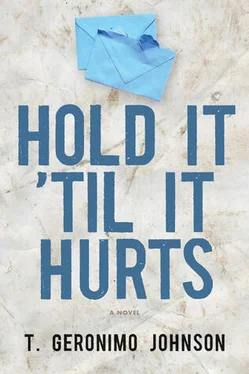After Wages’s service, they held no jazz procession because these now required a permit. The permit office had reopened the day before, but there was no jazz procession permit division. No one knew if it would be a new department, or considered a parade, or a protest. The last jazz procession Achilles had seen was blockaded by nearly twenty blazing police cars, the trombonist arrested for disturbing the peace. Ines, who was in the car with Achilles, called it an outrage and heartbreaking. Watching the pallbearers struggle to remain poised, the coachman soothing the horse — frightened by the sirens — with sugar cubes, and the mourners’ expressions of disbelief, Achilles had agreed with her. At least she didn’t say I told you so. Though he hated to admit it, Ines was right about transplants taking over. What else could you call it when people called the police to complain that a funeral march was disturbing the peace and squad cars arrived within five minutes? BK— before Katrina —you wouldn’t see a cop in the Tremé until the day after a homicide. The coroner often arrived before the cops.
The memorial repast was held across the street in the vestry. He excused himself and slipped into the church next door, a small one, just a nave and an altar. The brick walls were intact, but the cupola and the cross that once stood high above it were no more. In their stead, one perfectly round hole opened to the sky, through which the waters had rushed in, fading the pulpit and rotting the dais. The stained glass hadn’t yet been replaced, nor the clerestory windows, nor the side door, nor the pews, so there was no place to sit. It was dark, but he knew the church well. He and Ines attended every Sunday, because the diocese had decided that her church, St. Augustine, wouldn’t be reopened because it wasn’t profitable .
Twelve of Ines’s friends, including Margaret, were staging a sit-in, but the future looked bleak for the congregation. Achilles felt sorry for them. He’d never considered that people might actually need their church, but recently worship was the center of everyone’s life. Since returning to New Orleans, he and Ines had been to the same tiny, pewless church six times, gathered sometimes around a coffin, sometimes an urn, sometimes an article of clothing. He now understood that church helped people through tough times. It didn’t matter whether he thought the stories ridiculous, or preachers ostentatious, or the diocese despicable for declaring a church unprofitable. He likened this revelation to the experience of someone who had never known they needed glasses, and once fitted with a pair realized that the clouds of green above the trees were comprised of individual leaves. The storefront churches weren’t ridiculous. It never was about the building.
A whispering teenage couple dressed in a tux and formal gown ducked into one of the corners of the church. Seeing no one about, they started making out. Achilles knelt at the altar and thought about his father and mother, Troy, Merriweather, O’Ree, Dixon, Price, Wexler, Wages, everybody. He didn’t know if that counted as prayer, but he thought, visualized them, concentrating until he saw Wages, felt Wages’s hand on his head, heard Wages say, as he used to, Let’s get oscar-mike, Connie.
The teens were still tucked into the corner, kissing in the shadow of a stack of coffins. He pretended not to see them. Achilles wanted to say good-bye to Mrs. Wages before he and Ines left. He found her at the grave. She was tall like Wages, her hair even redder. She had stood with her back rigid and stared straight ahead while the preacher spoke, her hands clasped to her chest as if in prayer, remaining a few feet from the coffin even as everyone filed by to touch it one last time. Shoulders rounded, head down, she was relaxed, as if all she wanted was privacy. The vault had been sealed, the flowers and drapery removed, and she stood with one hand on the cool cement wall, her other tracing the names carved into the stone.
Achilles softly whispered his good-bye. He wouldn’t have recognized her from the pictures in which her hollow cheeks, combined with her broad forehead and large, piercing eyes, gave her an air of regency befitting an elder queen. Now, those cheeks red and puffy, the large brow furrowed, the eyes dull, called to mind his mother at his father’s funeral and at the funeral yet to be, the inevitability of his own duty, and his failing as a son. Forced to look away, he was surprised to see two tombs with Kyle Wages etched into them. He had thought the infant was buried with Bethany’s family. As if reading his mind, Mrs. Wages said, “His father. The first Gulf War.”
They hugged, Mrs. Wages squeezing tightly, as a mother would.
“Thank you,” she said. “I know how you all are about funerals.”
Achilles nodded. How could he not have come? “Have you been to the house?”
“I know you stayed there, that you know it. I was hoping … I know it’s terrible. I wanted his medals, but I couldn’t go … up there.”
Achilles held up his hands, halting her. “Of course. Where are you staying?”
She gave him the name of the hotel. “Thank you, Achilles. He said you were like a brother.”
“Yes, ma’am. He was too,” said Achilles. “I’ll bring whatever I can find.” Even as the tears welled up in Mrs. Wages’s eyes, Achilles regretted the promise. He had no intention of entering Wages’s house ever again. He saw Ines in the vestry entry and waved her toward the parking lot.
As soon as they were in the car, Achilles jammed the program into the glove box and Ines kicked her shoes off and rubbed her arches. “Here.” He extended his hands, offering his lap, and they drove like that, he rubbing her foot with his free hand, her sighing. They went home to change and then on to the phone bank, which had been relocated to a donated office in the Quarter.
He wanted to be with Ines all day, every day, like it used to be, but she forbade it. She didn’t want him volunteering because it was too spooky . “You spook me. I look over and see you all scarred up, like you were when I first met you, and it’s like we’re in a play with one act that keeps repeating itself. Besides, Charlie 1 needs you.”
Ines didn’t know that he hadn’t patrolled with them for three weeks. During the day, he wandered around, or sometimes went back to the condo and slept. That day, he went to Wages’s house as promised.
Wages’s neighborhood had always been the opposite of Uptown, but never was that more evident than after the flood. Achilles hadn’t even seen a rat, and no military checkpoints regulated traffic. There were a few Humvees parked on the median at major intersections, but they were empty, only reminders or warnings, which one he was never sure. He’d gone the first day that the city cleared enough debris. The little red duplex was tagged with the spray paint circle and cross and the number three, indicating that three bodies were found. He’d assumed it was for the neighbor. It had to be. He’d pushed at the swollen door and it fell over, twisting on one hinge. The smell was awful, the kind of stench that carved dread in your heart and set the pulse racing before you entered a building. From the porch he could see the furniture piled against the back wall of the living room, as if swept there by a giant broom. Each visit thereafter, he had remained on that porch like a man mesmerized by an abyss, remembering the last time he saw Wages, and all the questions he wished he had asked him. On each trip, he planned to go to the attic and salvage anything that Wages’s mother might want because he knew it would eventually come to that, but he kept picturing Margaret and her book.
Margaret volunteered for the Eulogy Archive, a project dedicated to memorializing Katrina victims. Achilles had assumed Wages was okay and hadn’t worried about not hearing from him. Many people were out of communication. But after he didn’t hear from Wages for a couple weeks, he went to the archive. He found the ledger for the Wageses: Kyle, Bethany, and Kyle Jr. Trapped in the attic, Bethany tried to fit Kyle Jr. through the vent pipe. He got stuck and drowned shortly after she did. When Wages reached the house and found the bodies, he lay down beside his wife and shot himself. Achilles, knowing that, swore he’d never enter that house again, blue envelope or not.
Читать дальше












